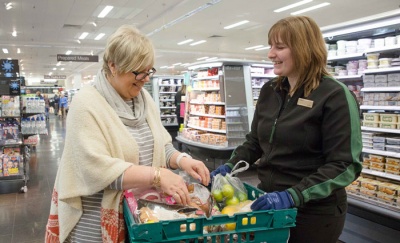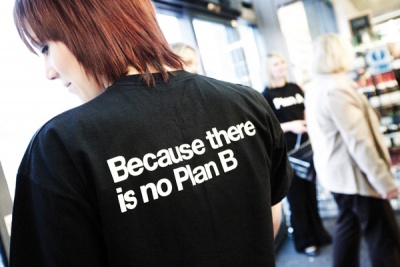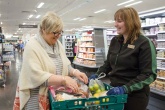Charity link-up leads to M&S food waste drop
 Marks & Spencer (M&S), has reduced its stores’ food waste by nine per cent through its charity redistribution schemes, according to its 2016 ‘Plan A’ report published today (9 June).
Marks & Spencer (M&S), has reduced its stores’ food waste by nine per cent through its charity redistribution schemes, according to its 2016 ‘Plan A’ report published today (9 June).
The retailer says it has made ‘good progress’ in its programme to become more ethical and ecological, including commitments to food and microbead waste reduction.
Plastic microbeads, a hot topic currently being investigated by the Environmental Audit Committee, from wash-off personal care products were removed in April 2015, almost a year ahead of the 2016 Plan A target.
The report launched today is the first under new CEO Steve Rowe and outlines the progress of the company in 2015/16. It claims that 22 commitments were achieved in the last year and the firm says it wants to continue in this manner by ‘putting the customer at the heart of the plan’.
As well as improvements on food waste and action against microbeads, the company also says it has reduced energy and water used by 39 per cent and 31 per cent respectively.
The Plan A programme was launched in January 2007 to help the clothing and food retailer source more responsibly, help communities and reduce waste. It started out as a five-year plan with 100 commitments but has since been revised to the Plan A 2020 programme, which has 100 ‘new, revised and existing commitments’ to enable the firm to become more sustainable.
139 tonnes of food redistributed
In Plan A 2020, M&S set a target to reduce its food waste by 20 per cent by 2020 and since then has trialled several initiatives to find the ‘most effective way of redistributing surplus food’, food nearing its sell-by date.
In October 2015 the store launched a nationwide food redistribution scheme in collaboration with neighbourly, a social network and mobile app that connects charities that want surplus food with the companies that produce it.
Using the app, stores can show details of the surplus food they have and charities can claim the food and collect it. According to the M&S neighbourly profile page, which is regularly updated, the company has so far redistributed 139.44 tonnes of food, resulting in a CO2 saving of 69.72 tonnes.
The initiative has resulted in food being donated to 500 charities, such as food banks and community cafes, and has helped the company achieve a reduction of food waste equivalent to nine per cent per 1,000 square foot of food selling space. Food makes up a big part of M&S’s business – in the last year, food sales have increased 3.6 per cent to £5.4 billion.
Microbeads removed from ‘wash-off’ products
The report also revealed that M&S stopped using plastic microbeads in its ‘wash-off personal care products’ in April 2015, approximately a year in advance of its 2016 Plan A target.
Microbeads are small pieces of plastic less than five millimetres in size commonly used in cosmetic products such exfoliants and toothpaste. As plastic is very durable, microbeads do not biodegrade, are ingested by marine life and can accumulate inside them. It is not clear what effect this has but it is thought microbeads could be harmful to marine life and to humans.

The report also highlighted other achievements such as the development of an interactive supply chain map that details where M&S food, clothing and home products are produced and includes 690 clothing and 540 food suppliers.
In addition, M&S reports that all the palm oil used in its products comes from sustainable sources and the 2016 Plan A report includes its first human rights report.
'Simpler, more efficient, less wasteful' business
Steve Rowe, Chief Executive of M&S, said: “We are putting customers right at the heart of our business. That includes Plan A as much as any other part of our business and that’s why Plan A is now part of our customer and marketing team. It is a crucial part of how we engage with our customers, gain their trust and make every moment special for them. We know that Plan A is a win-win approach – a simpler, more efficient, less wasteful business is better for the planet and our bottom line – so we’ll chase that even harder.”
Mike Barry, Director of Sustainable Business at M& S, said: “2015 was an important year for sustainable business and Plan A. Yet again we’ve achieved tough and stretching targets. The successful Paris Climate negotiations and the launch of the UN’s 17 Sustainable Development Goals have created a long-term direction of travel for the global economy and companies need a bold vision and comprehensive plan to make sure they are aligned with these important agreements.
“Under Steve’s leadership we’ll continue to play our part and crucially put the customer at the heart of everything we do, nurturing the strong trust they have in us and inspiring them with new and innovative solutions to more sustainable living that feels personal and local to them.”
The M&S 2016 Plan A report can be viewed on the retailer’s website.








